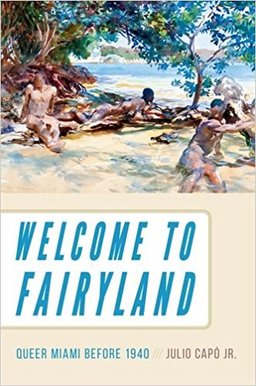| I’ve been to so many events at the Books and Books in Coral Gables that I’ve lost count, but not everyone can so thoroughly pack the reading space as Julio Capó Jr. did for his first book of nonfiction Welcome to Fairlyand: Queer Miami Before 1940 on February 23rd. With barely any standing room left, he began with a profound statement on the stories and research presented within the book: “These were histories the archives were never meant to preserve.” Capó dug through official archives in at least three countries and used the community to find artifacts of the time. He described poring through old phone books and calling everyone with a particular surname, hoping to find a descendant of a family that owned a now-defunct newspaper from the early 20th century. Blessed with a lucky stroke, he did find exactly who he was looking for, “with all the issues in their attic.” Capó then quickly corrected himself with a laugh. “Well, not attic. It’s Miami, right?” And that simple fact, that these are Miami stories, permeated the event. There was much discussion of how “people don’t take Miami seriously,” and that most people never had. Capó walked us through a brief outline of some major points of his work—how Miami has always existed on an urban frontier and how its queer culture has had a flavor all its own in how it changes and evolves and responds to the spaces it inhabits. |
Capó read one passage that highlighted the queer community’s resilience—the raid on the nightclub La Paloma in 1937 by nearly two hundred members of the KKK. The story highlighted the intertwining between organizations like the KKK and more institutionalized powers like law enforcement, especially given the bolstering response from the Sheriff at the time. The audience shared in Capó’s delight when he explained that after La Paloma reopened, it eventually integrated the raid into its programming as one of its shows.
As a last note, this was certainly the longest and most engaged question and answer session I have ever seen at a Books and Books event, with the eager audience asking after more and more information. Fortunately, I’d anticipated a rush on buying the book and snagged one on the way in, because when Capó settled in to sign books, the line built up immediately.
—Chazz Chitwood


 RSS Feed
RSS Feed